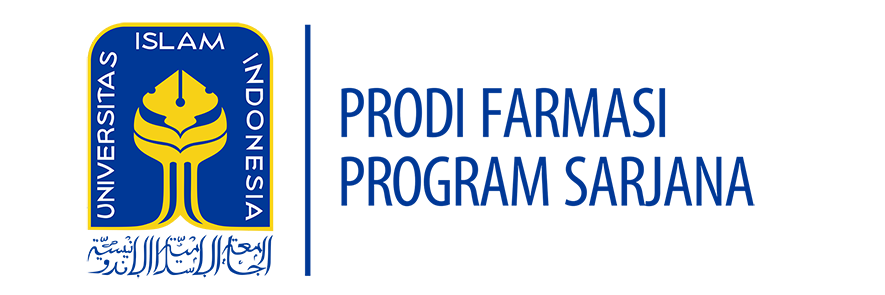| Module Name |
Medicinal Chemistry |
| Module level, if applicable |
2th year |
| Code, if applicable |
SFA-439 |
| Semester (s) in which the module is taught |
Fourth semester |
| Person responsible for the module |
apt. M. Hatta Prabowo, M. Si. |
| Lecturer(s) |
apt. M. Hatta Prabowo, M. Si. |
| Language |
English- Indonesia |
| Relation to curriculum |
Compulsory course |
| Types of teaching and learning |
Class size |
Attendance time (hours per week per semester) |
Forms of active participation |
Workload |
|
| Teaching |
50 |
2 |
Collaborative discussion |
Lecture: 2 (hour) x 14 (meeting) |
28 |
| Case Based Learning |
Presentation |
Preparation and follow up 4 (hour) x 14 (self-learning) |
56 |
| Total workload |
84 hours |
| ECTS |
3 ECTS |
| Credit points |
2 CU |
| Requirements according to examination regulations |
Minimum attendance at lectures is 75% (according to UII regulation). Final score is evaluated based on assignment and reports (40%) and exam (60%) |
| Recommended prerequisites |
Pharmacology |
| Related course |
– |
| Module objectives/intended learning |
By the end of this course students should be able to:
- Explain the mechanism of drug action and the relationship between the structure of the activity of various drug compounds according to the target of action.
- Explain the relationship between functional groups and pharmacological activities and their application in drug discovery
- Explain the discovery of medicine/drug in Islamic history and its relation to modern medicine
- Contribute in teamwork to solve Medicinal Chemistry cases
|
| Content |
The course will cover:
- The mechanism of action of the drug and the structural relationship of the activity of various drug compounds according to their target of action.
- Relationship of functional groups with pharmacological activity and their application in the development of new drugs.
- Drug discoveries in Islamic history are associated with modern medicine.
|
| Study and examination requirements and forms of examination |
Mid-term, Final term, presentation, quiz, assignment, and collaborative discussion |
| Media employed |
Text books, slides (power points), and video |
| Reading lists |
- Lemke T. L., Williams D. A., Roche V. F., Zito S. W. (Editors), 2013, Foye’s Principal Medicinal Chemistry 7th Edition, Wolters Kluwer-Lippincott Williams and Wilkins, Philadelphia
- Patrick G. L., 2013, An Introduction to Medicinal Chemistry 6th Edition, Oxford University Press, Oxford
- Wermuth C. G., Aldous D., Raboisson P., Rognan D. (Editors), 2015, The Practice of Medicinal Chemistry 4th Edition, Elsevier, Amsterdam
- Beale, J.M., Block, J.H., 2011, Wilson and Gisvold’s textbook of organic medicinal and pharmaceutical chemistry. 12th ed. Wolters Kluwer-Lippincott Williams and Wilkins, Philadelphia.
|
